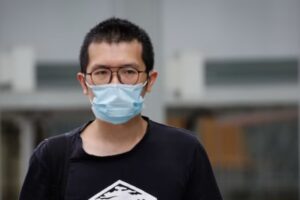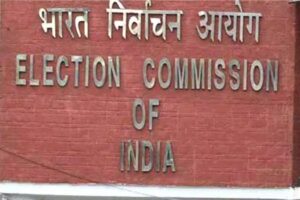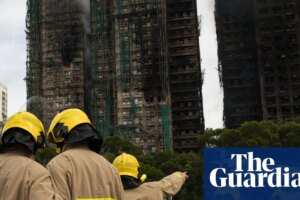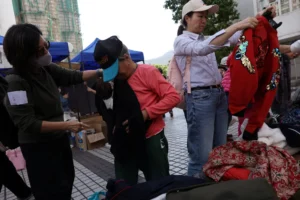
“After six years of reporting in Hong Kong, and at eight months pregnant, I’m very sad to be leaving my colleagues, friends and the place I’ve called home,” wrote senior Bloomberg News reporter Rebecca Choong Wilkins in an X post on Saturday. As other outlets confirmed, the Hong Kong government refused to renew Choong Wilkins’ visa in what many journalists and media organizations have described as the latest blow to press freedom in the city. David Pierson at The New York Times provided more information on the incident:
The journalist, Rebecca Choong Wilkins, was not given a reason for her visa rejection despite having worked for Bloomberg in Hong Kong for six years, the Foreign Correspondents’ Club of Hong Kong said in a statement posted online on Friday evening.
Bloomberg News confirmed on Saturday that Ms. Choong Wilkins, a British national, had been denied a new visa, but it provided no additional details. The news organization has dozens of employees in Hong Kong because of its significance as a financial hub and its proximity to mainland China.
[…] Ms. Choong Wilkins covers a range of economic and political news about China and Hong Kong. In April, she wrote about a British lawmaker being barred from entering the territory. Last November, she wrote about how a Chinese dissident in Canada monitoring protests in China provided investors clues about the Chinese economy. [Source]
Media organizations criticized the visa denial. The Foreign Correspondents’ Club of Hong Kong stated that it was “deeply concerned” and that “this decision and the lack of explanation reinforces widespread concerns about the erosion of press freedom in Hong Kong, which is protected under the Basic Law and the Bill of Rights.” The Committee for Freedom in Hong Kong Foundation described it as “[a]nother nail in the coffin of #HongKong’s once celebrated #PressFreedom & the integrity of the Basic Law,” and the Hong Kong Democracy Council wrote, “This appears to be yet another sign of the ongoing drastic erosion of #PressFreedom in #HongKong.” Reporters Without Borders (RSF) Advocacy Manager Aleksandra Bielakowska stated, “Straight out of China’s playbook. Rebecca Choong is yet another victim of visa weaponization, a tactic well known to foreign journalists working in Beijing. Her case is further proof of the deterioration of press freedom in Hong Kong which continues to edge closer to that of China.” Last April, Bielakowska was denied entry to Hong Kong on her way to observe the national security trial of media mogul Jimmy Lai.
Almost exactly one year ago, Choong Wilkins wrote a thread on X commenting on other foreign media figures who were denied entry to Hong Kong. RSF said that nine journalists have had visa issues in Hong Kong since the 2020 National Security Law was enacted. Reporting on this latest incident, Tom Grundy at the Hong Kong Free Press listed other notable incidents of journalists denied visas to Hong Kong:
It is not the first time local authorities have denied a visa renewal to a journalist. Last year, Bloomberg journalist Haze Fan saw her visa application rejected, with no reason given.
Months later, award-winning Associated Press photographer Louise Delmotte was denied entry to Hong Kong after her visa renewal was denied without any reason given.
In 2020, Hong Kong Free Press was denied a work visa, without reason, for an Irish journalist who had been working for Bloomberg. The New York Times’s Chris Buckley was also denied a visa in 2020, after Victor Mallet of the Financial Times had an application rejected in 2018.
A reporter from The Economist was also denied a visa in 2021 without reason. [Source]
Similar challenges persist in mainland China. Last week, the Foreign Correspondents’ Club of China (FCCC) released its annual report on the state of press freedom in China. The FCCC’s findings build on its report from last year that documented continued surveillance, obstruction, and intimidation of foreign correspondents in China. In this year’s report, titled “New Red Lines,” the organization found an “alarming expansion of ‘off-limit’ topics and growing unpredictability in the boundaries Chinese authorities deem sensitive,” revealing an institutionalization of state controls on independent reporting:
While longstanding red lines such as coverage of Xinjiang, Tibet, Hong Kong, or direct references to Xi Jinping remain firmly in place, emerging new off-limits topics include China’s economy, once seen as nonpolitical. Issues such as tariffs, electric vehicles, tech policy, unemployment, and labour conditions now routinely attract heightened scrutiny from authorities. An increasingly unpredictable range of topics drew backlash — from Halloween celebrations in Shanghai to a wide range of societal issues such as gender inequality and the aging population. Ever-present surveillance by police, plainclothes operators, drones, and digital tracking severely constricted space for truly independent reporting. Nearly nine out of ten (86 percent) of journalists said interview requests were declined or canceled, almost 40 percent (38 percent) said Chinese colleagues had been harassed or intimidated, and almost one out of ten respondents were manhandled or encountered physical violence.
In addition, four out of ten respondents said they canceled reporting trips or interviews (38 percent) due to official pressure, up from 31 percent in 2022. Of the trips that went ahead, a significant share of respondents — 42 percent — said they were obstructed by officials, and an equal share reported obstruction by unknown individuals. Some journalists experienced both.
[…] Meanwhile, despite a welcomed reduction in the wait time for visas, one-quarter of news bureaus remained understaffed due to visa impediments, down from about one-third the previous year. Authorities apparently sought to influence reporting by restricting visas and access for reporters and news organizations whose coverage they disagreed with, threatening or launching lawsuits, and complaining to media headquarters about content. [Source]
For more information on China’s expanding censorship of economic and business topics in recent years, see CDT’s coverage of statistics censorship, tariff commentary, speeches by economists, restrictions on “badmouthing the economy,” and 2024’s most notable “Sensitive Words” and deleted articles and essays.





